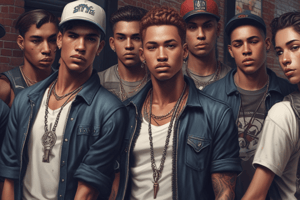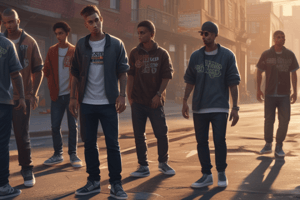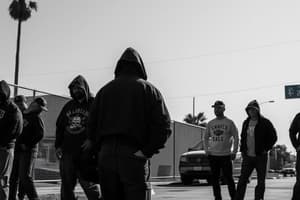Podcast
Questions and Answers
What was the author discussing with urban sociologists at the University of California, Berkeley?
What was the author discussing with urban sociologists at the University of California, Berkeley?
- Inequality and social issues (correct)
- Criminalization and police misconduct
- Causes of disproportionate crime among African Americans
- Violence and gangs in the inner city
What did the primarily White, male, and middle-class graduate students and faculty continue to dissect from the comfort of the university?
What did the primarily White, male, and middle-class graduate students and faculty continue to dissect from the comfort of the university?
- Disproportionate crime among African Americans
- Culture of violence in the inner city
- Ghetto culture and violence (correct)
- Immigrants' involvement in gangs
What was the equally pressing topic in Spider's mind as the author intended to ask about violence and gangs?
What was the equally pressing topic in Spider's mind as the author intended to ask about violence and gangs?
- Inequality and social issues
- Criminalization and police misconduct (correct)
- Disproportionate crime among African Americans
- Immigrants' involvement in gangs
What did the author discover from youth accounts and observations?
What did the author discover from youth accounts and observations?
What faded from the author's rearview mirror as they left Berkeley?
What faded from the author's rearview mirror as they left Berkeley?
What was the urgent reason for the author to hit the streets and catch up with Spider?
What was the urgent reason for the author to hit the streets and catch up with Spider?
The young people interviewed perceived themselves to be criminalized by which of the following authority figures?
The young people interviewed perceived themselves to be criminalized by which of the following authority figures?
Which authority figure attempted to influence how Jose's mother parented?
Which authority figure attempted to influence how Jose's mother parented?
What did Jose's mother feel when the probation officer visited her?
What did Jose's mother feel when the probation officer visited her?
Why did some parents come to have similar perspectives as police and probation officers?
Why did some parents come to have similar perspectives as police and probation officers?
What was Jose's first offense, according to the text?
What was Jose's first offense, according to the text?
How did Jose feel after his first arrest?
How did Jose feel after his first arrest?
What was the main consequence of Spider being falsely labeled as a gang member?
What was the main consequence of Spider being falsely labeled as a gang member?
What type of school did Spider attend?
What type of school did Spider attend?
Who questioned Spider's mother about his gang involvement during his hospital stay?
Who questioned Spider's mother about his gang involvement during his hospital stay?
What reputation did the school principal, Mr. Ellis, have?
What reputation did the school principal, Mr. Ellis, have?
Why did Spider and other students pretend to use more drugs than they actually did during class?
Why did Spider and other students pretend to use more drugs than they actually did during class?
Who supported the labeling of Spider as a culprit despite him being the victim of a violent attack?
Who supported the labeling of Spider as a culprit despite him being the victim of a violent attack?
What was the substitute teacher's comment about leading students to prison?
What was the substitute teacher's comment about leading students to prison?
What was the reason for the high turnover rate for teachers at the school?
What was the reason for the high turnover rate for teachers at the school?
What did students express disdain for during the earth science lesson?
What did students express disdain for during the earth science lesson?
What did Julio possibly pretend to do in order to gain respect from his peers?
What did Julio possibly pretend to do in order to gain respect from his peers?
How did students attempt to resist criminalization in the school environment?
How did students attempt to resist criminalization in the school environment?
What caused fear and humiliation among students, as described in the text?
What caused fear and humiliation among students, as described in the text?
How do some adults in the community view the boys?
How do some adults in the community view the boys?
What role does punishment, as an institution, play in shaping the lives of the boys in the study?
What role does punishment, as an institution, play in shaping the lives of the boys in the study?
How did marginally situated young people's 'play' lead to their criminalization?
How did marginally situated young people's 'play' lead to their criminalization?
What was the response to large gatherings of Black youths in Philadelphia in 2010?
What was the response to large gatherings of Black youths in Philadelphia in 2010?
How did the system of imposing punitive social control unintentionally contribute to the criminalization of the boys?
How did the system of imposing punitive social control unintentionally contribute to the criminalization of the boys?
How do young people cope with patterns of punishment?
How do young people cope with patterns of punishment?
What role did probation officers play in the lives of the boys interviewed?
What role did probation officers play in the lives of the boys interviewed?
What did Deandre's probation officer, Ms. Moore, expect from him in the contract she wrote?
What did Deandre's probation officer, Ms. Moore, expect from him in the contract she wrote?
How did the probation experience vary for the boys interviewed?
How did the probation experience vary for the boys interviewed?
What was the primary concern for the boys regarding probation meetings at community centers?
What was the primary concern for the boys regarding probation meetings at community centers?
What was the outcome for fourteen of the thirty boys who were released from probation during the study?
What was the outcome for fourteen of the thirty boys who were released from probation during the study?
What was the main drawback of probation according to the text?
What was the main drawback of probation according to the text?
What impact did probation officers' presence have on the young men?
What impact did probation officers' presence have on the young men?
What did Michel Foucault argue about the impact of constant surveillance on the young men?
What did Michel Foucault argue about the impact of constant surveillance on the young men?
What was the result of probation officers' punitive approach, as stated in the text?
What was the result of probation officers' punitive approach, as stated in the text?
What was the primary issue with the system of social control encountered by the boys?
What was the primary issue with the system of social control encountered by the boys?
According to the criminologists John Hagan and Bill McCarthy, what produces social solidarity?
According to the criminologists John Hagan and Bill McCarthy, what produces social solidarity?
Why did many of the youths feel that probation officers had minimal credibility with them?
Why did many of the youths feel that probation officers had minimal credibility with them?
What did some of the boys resort to after being tested for marijuana use through urine tests by probation officers?
What did some of the boys resort to after being tested for marijuana use through urine tests by probation officers?
What was the community's reaction to a youth being placed on probation, as observed by Ronny?
What was the community's reaction to a youth being placed on probation, as observed by Ronny?
Why did some of the boys believe that probation officers exaggerated their threats?
Why did some of the boys believe that probation officers exaggerated their threats?
What was a common pattern observed in the enrollment of young people in community programs according to the text?
What was a common pattern observed in the enrollment of young people in community programs according to the text?
How many boys were enrolled in community-center programs after being previously arrested?
How many boys were enrolled in community-center programs after being previously arrested?
What was the primary reason for the lack of community programs for young people in the neighborhoods?
What was the primary reason for the lack of community programs for young people in the neighborhoods?
What was the estimated number of young people living in the neighborhoods serviced by the community centers?
What was the estimated number of young people living in the neighborhoods serviced by the community centers?
What type of funding became available during the study period for providing mentoring for gang youths in the community?
What type of funding became available during the study period for providing mentoring for gang youths in the community?
What was the primary consequence of the community center's funding dependency on the county probation department?
What was the primary consequence of the community center's funding dependency on the county probation department?
What was the main concern regarding the Cease-Fire program as mentioned in the text?
What was the main concern regarding the Cease-Fire program as mentioned in the text?
What impact did the heavy caseloads and high expectations have on charismatic individuals at the community center?
What impact did the heavy caseloads and high expectations have on charismatic individuals at the community center?
How did young men respond to the perceived lack of second chances from institutions and the development of coping skills seen as deviant by the system?
How did young men respond to the perceived lack of second chances from institutions and the development of coping skills seen as deviant by the system?
How did institutions like community centers, schools, and families contribute to the boys' perception of being criminalized?
How did institutions like community centers, schools, and families contribute to the boys' perception of being criminalized?
Flashcards are hidden until you start studying
Study Notes
-
The author has observed a disconnect between how young men in the community view adults and how the author perceives the intentions of adults towards the boys.
-
Some adults in the community believe the boys are irreparable criminals and push for their punishment.
-
Other adults, despite their caring attitude towards the boys, are influenced by a system of imposing punitive social control, unintentionally contributing to the criminalization of the boys.
-
Criminologist David Garland's analysis of punishment as an institution is used to understand how criminalization plays a role in shaping the lives of the boys in the study.
-
Punishment, as an institution, interacts with its environment and forms part of the social world, constructing shared categories and authoritative classifications.
-
Young people, having agency, develop systems of interaction and resistance to cope with patterns of punishment.
-
Marginally situated young people's "play" has been criminalized, with events like flash mobs leading to their criminalization.
-
In Philadelphia in 2010, large gatherings of Black youths were met with heavy police presence and criminalization in response to a few incidents of violence and vandalism in downtown areas.
-
Spider, one of the boys in the study, was brutally attacked by gang members and nearly died.
-
Detectives visited him at the hospital after the incident.
-
Probation officers' presence in the lives of young men could potentially have a positive impact on their rehabilitation and reintegration into society.
-
Many young men followed probation orders only in the presence of officers, but resisted external threats and developed resentment.
-
Resistance sometimes led to deviance and criminality, resulting in arrests for violating probation contracts.
-
Probation placed young men in difficult situations, between following orders and being victimized by peers.
-
Probation created a magnifying-glass effect, leading to more involvement in criminal justice system for minor infractions.
-
Probation officer Mr. Johnson was a tall, gruff Black man who wore a cowboy hat and boots, and used fear tactics to keep young men in line.
-
Fear tactics did not work long-term, leading some young men to resist and even purposefully break rules.
-
Michel Foucault argues that constant surveillance ("panopticism") leads to self-discipline, but young men in Oakland were not being taught this.
-
Instead, young men in Oakland manipulated the system, agreeing to obey under coercion and resisting at the same time.
-
Probation officers' punitive approach led to young men feeling incapacitated and unable to function as law-abiding citizens.
-
Young men resisted probation and created a spectacle of the system, exposing its flaws and contradictions.
-
Direct threat and coercion from probation officers was only a temporary fix, leading to more criminal behavior once the intensive probation program ended.
-
The community center relied on funding from the county probation department after their own funds expired.
-
County wanted direct oversight of Joey, a trusted community worker at the center, leading to loss of respect from youths.
-
Few "at-risk" youths were accepted into programs, community centers prioritized those who would respond positively to their programming due to funding dependencies.
-
Charismatic individuals, who often have transformational skills, were given heavy caseloads and high expectations, leading to burnout.
-
Cease-Fire, a program aimed at preventing violence, may pose a risk of entangling law enforcement with community workers.
-
Institutions like community centers, schools, and families were perceived by boys as collaborating to criminalize them.
-
Young men felt they were not given a second chance, leading to resistance and the development of coping skills seen as deviant by the system.
-
Institutions intersected, providing a consistent flow of criminalization and brutal consequences.
-
Young men, in response to the system, demonstrated mistrust and contempt towards the wider scheme of things.
Studying That Suits You
Use AI to generate personalized quizzes and flashcards to suit your learning preferences.




